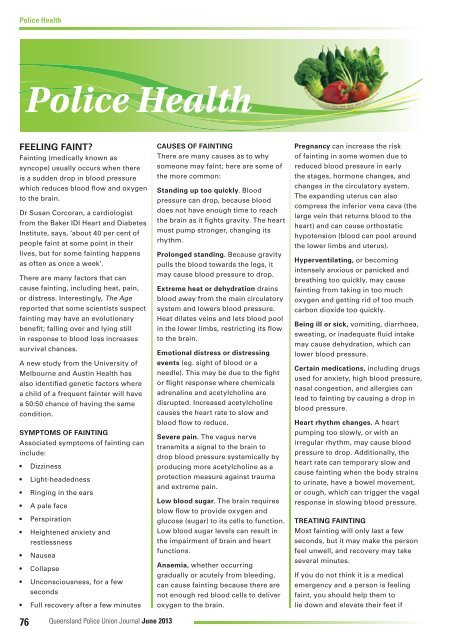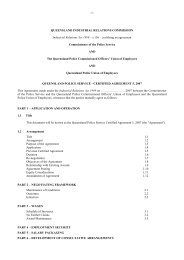Queensland Police Union Journal
Queensland Police Union Journal
Queensland Police Union Journal
Create successful ePaper yourself
Turn your PDF publications into a flip-book with our unique Google optimized e-Paper software.
<strong>Police</strong> Health<br />
<strong>Police</strong> Health<br />
by Peter Shanahan, <strong>Police</strong> Health Chairman<br />
FEELING FAINT?<br />
Fainting (medically known as<br />
syncope) usually occurs when there<br />
is a sudden drop in blood pressure<br />
which reduces blood flow and oxygen<br />
to the brain.<br />
Dr Susan Corcoran, a cardiologist<br />
from the Baker IDI Heart and Diabetes<br />
Institute, says, ‘about 40 per cent of<br />
people faint at some point in their<br />
lives, but for some fainting happens<br />
as often as once a week’.<br />
There are many factors that can<br />
cause fainting, including heat, pain,<br />
or distress. Interestingly, The Age<br />
reported that some scientists suspect<br />
fainting may have an evolutionary<br />
benefit; falling over and lying still<br />
in response to blood loss increases<br />
survival chances.<br />
A new study from the University of<br />
Melbourne and Austin Health has<br />
also identified genetic factors where<br />
a child of a frequent fainter will have<br />
a 50:50 chance of having the same<br />
condition.<br />
SYMPTOMS OF FAINTING<br />
Associated symptoms of fainting can<br />
include:<br />
• Dizziness<br />
• Light-headedness<br />
• Ringing in the ears<br />
• A pale face<br />
• Perspiration<br />
• Heightened anxiety and<br />
restlessness<br />
• Nausea<br />
• Collapse<br />
• Unconsciousness, for a few<br />
seconds<br />
• Full recovery after a few minutes<br />
CAUSES OF FAINTING<br />
There are many causes as to why<br />
someone may faint; here are some of<br />
the more common:<br />
Standing up too quickly. Blood<br />
pressure can drop, because blood<br />
does not have enough time to reach<br />
the brain as it fights gravity. The heart<br />
must pump stronger, changing its<br />
rhythm.<br />
Prolonged standing. Because gravity<br />
pulls the blood towards the legs, it<br />
may cause blood pressure to drop.<br />
Extreme heat or dehydration drains<br />
blood away from the main circulatory<br />
system and lowers blood pressure.<br />
Heat dilates veins and lets blood pool<br />
in the lower limbs, restricting its flow<br />
to the brain.<br />
Emotional distress or distressing<br />
events (eg. sight of blood or a<br />
needle). This may be due to the fight<br />
or flight response where chemicals<br />
adrenaline and acetylcholine are<br />
disrupted. Increased acetylcholine<br />
causes the heart rate to slow and<br />
blood flow to reduce.<br />
Severe pain. The vagus nerve<br />
transmits a signal to the brain to<br />
drop blood pressure systemically by<br />
producing more acetylcholine as a<br />
protection measure against trauma<br />
and extreme pain.<br />
Low blood sugar. The brain requires<br />
blow flow to provide oxygen and<br />
glucose (sugar) to its cells to function.<br />
Low blood sugar levels can result in<br />
the impairment of brain and heart<br />
functions.<br />
Anaemia, whether occurring<br />
gradually or acutely from bleeding,<br />
can cause fainting because there are<br />
not enough red blood cells to deliver<br />
oxygen to the brain.<br />
Pregnancy can increase the risk<br />
of fainting in some women due to<br />
reduced blood pressure in early<br />
the stages, hormone changes, and<br />
changes in the circulatory system.<br />
The expanding uterus can also<br />
compress the inferior vena cava (the<br />
large vein that returns blood to the<br />
heart) and can cause orthostatic<br />
hypotension (blood can pool around<br />
the lower limbs and uterus).<br />
Hyperventilating, or becoming<br />
intensely anxious or panicked and<br />
breathing too quickly, may cause<br />
fainting from taking in too much<br />
oxygen and getting rid of too much<br />
carbon dioxide too quickly.<br />
Being ill or sick, vomiting, diarrhoea,<br />
sweating, or inadequate fluid intake<br />
may cause dehydration, which can<br />
lower blood pressure.<br />
Certain medications, including drugs<br />
used for anxiety, high blood pressure,<br />
nasal congestion, and allergies can<br />
lead to fainting by causing a drop in<br />
blood pressure.<br />
Heart rhythm changes. A heart<br />
pumping too slowly, or with an<br />
irregular rhythm, may cause blood<br />
pressure to drop. Additionally, the<br />
heart rate can temporary slow and<br />
cause fainting when the body strains<br />
to urinate, have a bowel movement,<br />
or cough, which can trigger the vagal<br />
response in slowing blood pressure.<br />
TREATING FAINTING<br />
Most fainting will only last a few<br />
seconds, but it may make the person<br />
feel unwell, and recovery may take<br />
several minutes.<br />
If you do not think it is a medical<br />
emergency and a person is feeling<br />
faint, you should help them to<br />
lie down and elevate their feet if<br />
76 <strong>Queensland</strong> <strong>Police</strong> <strong>Union</strong> <strong>Journal</strong> June 2013
















